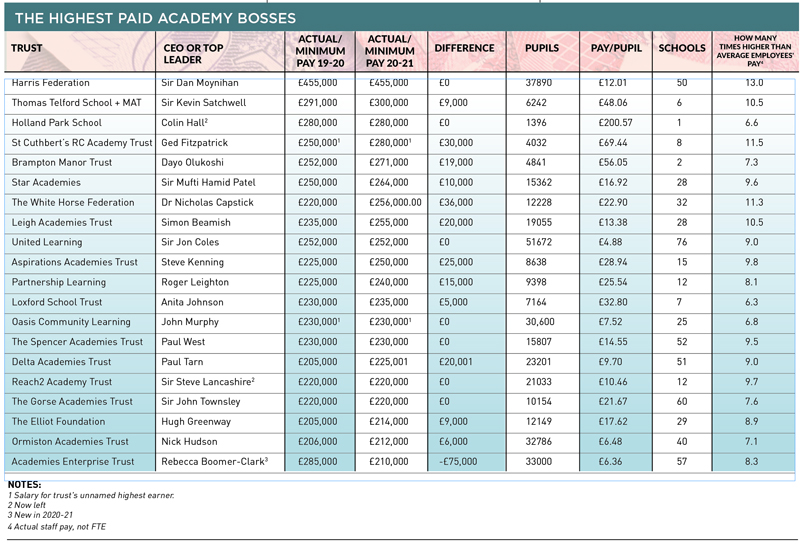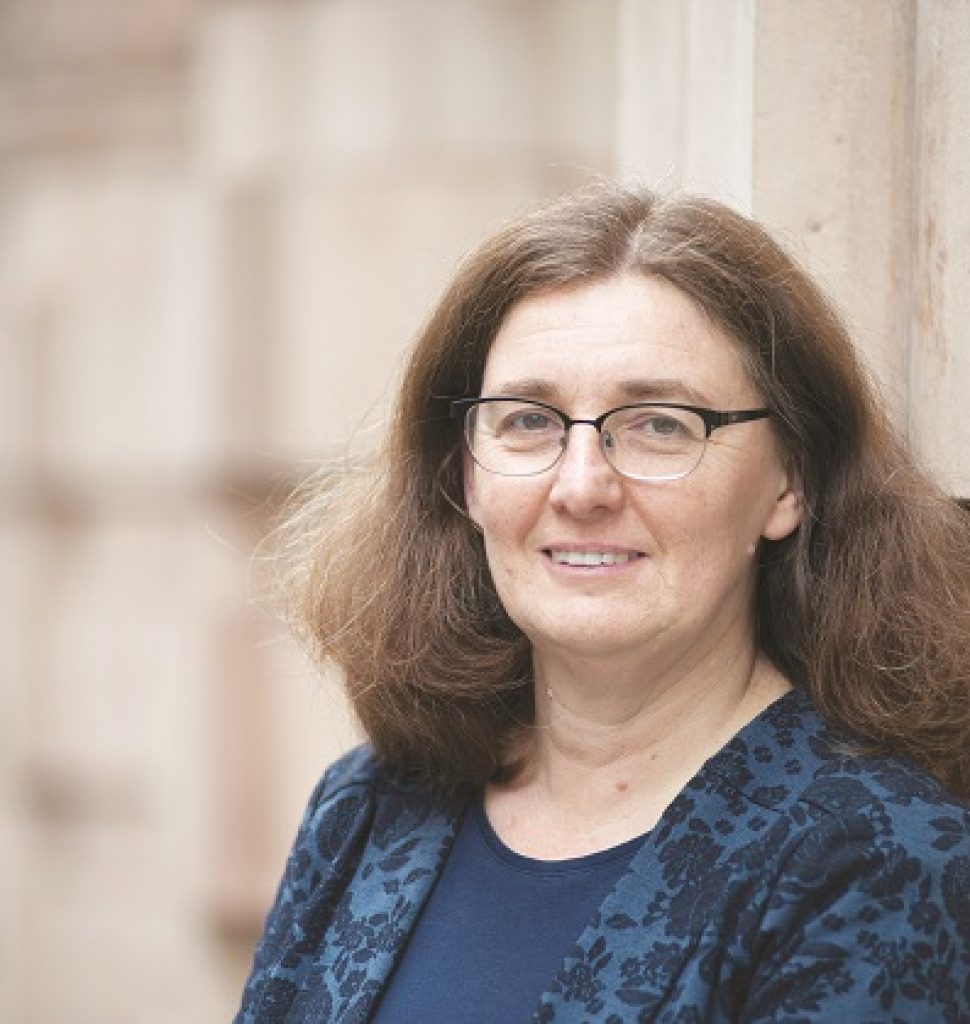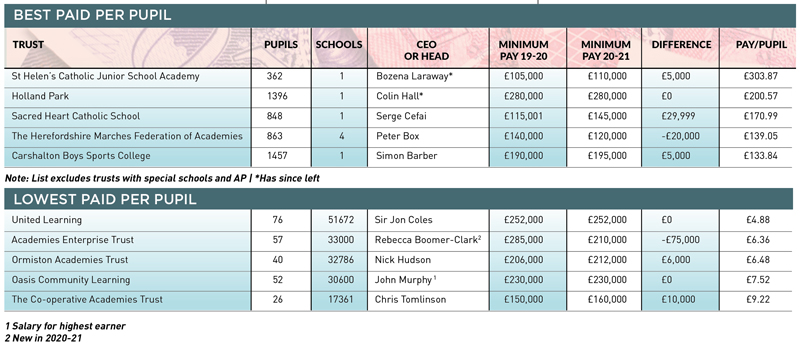The country’s best-paid academy trust leaders enjoyed bigger pay rises than their peers last year, new figures reveal.
Schools Week’s annual CEO pay investigation also reveals a £15,000 pay gap between top-paid male and female leaders.
The findings have sparked fresh calls for the government to revive its paused clampdown on “excessive” pay, although the findings suggest many trusts are using CEO departures to review their executive pay.
However, with a looming white paper expected to accelerate the drive to an all-trust system, Emma Knights, chief executive of the National Governance Association (NGA), said the government needed to “get a grip” on outliers to avoid fuelling anti-academy sentiment.
A new report today by the Public Accounts Commitee also warned that ministers lack a “sufficient handle on excessive pay”.
Average £7k rise for best-paid
Schools Week’s annual investigation into chief executive pay reveals that salaries among the best-paid have continued to rise.
We analysed 2020-21 annual accounts for 258 trusts that were previously sent letters by government concerning high pay.
Thirty-two CEOs earnt £200,000 or more – three more than in 2019-20.
The top 20 earners saw their wages rise an average of £6,655 to almost £255,000, a 2.7 per cent increase – similar to the 2.75 per cent average teacher pay rise that year.
The best-remunerated CEO remained the Harris Federation’s Sir Dan Moynihan, who earnt £455,000. Accounts state that three other unnamed staff earnt over £210,000, including one person on £300,000-£310,000.
Sir Kevin Satchwell, who leads both the Thomas Telford School and Thomas Telford MAT, became only the second trust CEO to breach the £300,000 mark.

‘Outrageous’ gap with staff
Moynihan’s salary is 13 times his staff’s average £34,940 earnings last year, while the top 20 best-paid average nine times their employees’ pay.
Mean staff earnings ranged from £22,716 at primary-only trust REAch2 to £42,390 at standalone London secondary Holland Park.
Schools Week calculated this metric by dividing wage bills by headcounts, as listed in annual accounts. Many trust accounts lacked full-time equivalent figures, which would mean smaller pay gaps.

Mike Short, head of education at Unison, said staff would be “nothing short of outraged” by the gap, and urged ministers to “act now to curb excessive pay”.
The National Governance Association recommends that trusts consider linking executive pay to median or lowest-paid FTE employee wages.
Some trusts already do this. REAch2 caps leadership pay at ten times that of newly qualified teachers.
Robert Halfon, chair of the education select committee, said: “Clearly, pay needs to be competitive and judged on results, but I believe this money could be better spent on teachers and frontline support staff.”
Rises follow ‘excellent performance’
Analysis shows 29 leaders’ minimum pay bands jumped by £15,000 or more, and 71 jumped by £10,000 or more.
Dr Jim McAtear of the Hartismere Family of Schools saw the largest increase, at almost £54,000. Accounts state he received around £44,000 as the four-school trust’s CEO, with most of the rise in his separately listed £157,000 earnings as head.
The rise is understood to be a one-off payment reflecting his headship of two schools in recent years without further pay at the time. It was paid last year as the schools’ and the trust’s finances had improved.
Dr Nicholas Capstick, The White Horse Federation CEO, saw the second biggest raise. His salary rose from £220,000-£225,000 to £256,000. The trust said he was also head of a primary, and received no pension contributions.
St Cuthbert’s Roman Catholic Academy Trust paid its highest earner at least £280,000 – a £30,000 minimum salary band jump for a second year in a row.
This makes chief executive Ged Fitzpatrick the country’s third best paid, up from 13th two years ago.
All the trusts declined to comment.
But other trusts were more forthright. Paul Tarn, chief executive of Delta Academies Trust, saw his pay rise from at least £205,000 to £225,000. Ormiston Academies Trust saw the pay of chief executive Nick Hudson increase £6,000 to £212,000 – putting him in the top 20.
Both trusts said the increases reflected “excellent performance” at some of the country’s largest trusts, and followed “robust review and market benchmarking”.

Clampdown paused…
In 2017 the government began writing to trusts seeking justifications for having £150,000-a-year leaders, or two £100,000-a-year earners. It also publicly named them.
But by 2019 only a quarter of trusts had reported cuts, and data errors halted letters altogether in 2020, with officials awaiting new accounts.

Two months after the accounts deadline, the clampdown itself remains under “review” and the Department for Education tight-lipped.
The NGA’s Knights said letters should resume, while Halfon backed “stringent” trust inspections to tackle pay.
The pause means a growing number of other trusts are not facing the same scrutiny.
Schools Week found 12 trusts running more than 20 schools are absent from DfE lists of trusts under scrutiny.
Bishop Hogarth Catholic Education Trust had the highest earner among them, with its accounts revealing that one employee earnt at least £200,000 – up from at least £170,000 in 2020. Its CEO is Dame Maura Regan. The trust did not respond to request for comment.
…but there are signs of restraint
Experts welcomed signs of restraint outside the top earners, however.
At written-to trusts, 23 no longer have any earners above £100,000. Among the remaining 235, a majority – 145 – have none earning £150,000.
Their average pay rose by only 2.2 per cent, lower than average both for the top 20 and for teachers. Seventy-three trusts froze executive pay, and 28 slashed it – amounting to just over two in five trusts.
The remaining 57 per cent of leaders got a rise, which is up on the 55 per cent of leaders getting pay rises last year.
Some trusts have slashed existing CEO pay, with the Rodillian MAT cutting Andy Goulty’s from at least £225,000 to £140,000-145,000 – the biggest fall. The trust did not comment.
The Kingsdale Foundation’s unnamed highest earner’s minimum pay fell by £70,000 to £150,000-£160,000. The standalone academy, led by Steve Morrison, did not comment.

Pay reined in after CEO exits…
Meanwhile, many trusts are using the departure of high-paid bosses to rein in pay.
The Joseph Leckie Academy’s highest earner received £90,000-100,000, down from £180-190,000 two years ago. Its head is James Ludlow, with the previous salary understood to be that of late ex-head Keith Whittlestone. The trust did not respond to request for comment.
Nova Education Trust scrapped senior performance bonuses and shook up leadership structures and teams to include more women after new chief executive Ashfaq Rahman joined last year.
“Financial bonus incentives were not in the spirit of the organisation’s ethos,” Rahman said.
The trust declined to reveal his pay, but said it was “significantly” below the £230,000 salary ex-CEO John Tomasevic earned in 2019-20.
Among the top 20, seven leaders’ bands were unchanged.
Moynihan’s pay was frozen at Harris, while the Elliot Foundation and its CEO Hugh Greenway agreed with unions to raise pay for everyone but him this year.

A Holland Park spokesman said governors would review CEO pay “shortly”.
David Bradley, of leadership support firm DRB, reported restraint among smaller and new trust clients more widely, reflecting awareness of government concerns and CEOs actively shunning rises.
Meanwhile Sharon O’Ryan, a benchmarking expert at Pay in Education (PiE), expects this year’s pay data to show further restraint amid a teacher pay freeze.
The Confederation of School Trusts’ CEO Leora Cruddas said trusts were also using sophisticated benchmarking data, and did not need DfE letters. CST launched a benchmarking service last year, while the NGA announced a partnership with PiE this month.
But Knights said pay was “hard to reverse” contractually outside of changeovers, meaning there had been “not as much change as one would hope for”.
A Delta spokesperson said it welcomed published pay comparisons, and backed calls for more metrics on “every penny spent outside the classroom” – with poor-value trusts stripped of schools.
…but women are still losing out
Schools Week identified four instances of male CEOs being replaced by women. Of these, two were replaced on lower salaries, one on the same, and one paid more.
Gail Brown’s £90,000-£100,000 pay as Ebor Academy Trust’s CEO was significantly below predecessor Richard Ludlow’s £120,000-£125,000 salary.
A spokesperson said trustees, too, were “concerned” at this difference after the appointment. They commissioned an independent review that involved benchmarking and then increased her pay.
Meanwhile, the country’s third-largest chain, Academies Enterprise Trust, “took the opportunity” to review CEO pay “as is typical” after Julian Drinkall left. He was paid at least £285,000 in pay and bonuses.
His replacement Rebecca Boomer-Clark earns £200,000, with up to £10,000 more in bonuses.

Vivienne Porritt, of female leadership group WomenEd, welcomed increased restraint, saying the sector should avoid a “race to the top”. But she said, more generally, recruitment was “broken”, with questions about past pay, subliminally gendered job descriptions and limited role models holding women back.
Two-thirds of the near 300 best-paid trusts in our analysis had male leaders, despite two-thirds of headteachers being women. Only two of the top 20 are female, one more than last year after Boomer-Clark joined AET.
Top-paid male leaders averaged £160,100 –more than £15,000 above female peers.
Cruddas said there was “always more we need to do” to improve diversity.
CEO pay is an ‘exaggerated debate’
Paul Whiteman, general secretary of school leaders’ union NAHT, warned of an “exaggerated debate”, saying school leaders’ salaries had dropped 15 per cent in real terms since 2010.
Leora Cruddas said trust pay was “slightly lower” than comparable organisations elsewhere. A CST survey reported average trust CEO pay of £130,000, but housing association executive pay averaged £189,600, according to Inside Housing.
School union leaders’ pay averaged £135,000, with Whiteman the highest paid, on £170,900.
Cruddas also noted DfE rules let maintained heads in London earn more than £150,000. Examples include now-retired Ges Smith, who earnt £154,000 as head of Jo Richardson Community School.
Barking and Dagenham Council accounts show he earnt a further £38,500 on top of that for temporarily covering another large secondary in trouble, at the secondary’s request.
The DfE was approached for comment.
Clarification: Analysis has been updated from the version first published in today’s edition.
















Some Trusts have always paid their CEO an acceptable amount. Why is there no mention of this in your article?
No mention of the 2020/21 publicised pay for an executive in the Bishop Chadwick Catholic Education Trust – in excess of £220k – the CEO is Mr Brendan Tapping . At this point the Trust was nowhere near it’s full capacity- where does this excessive pay get capped and who challenges the value for money?